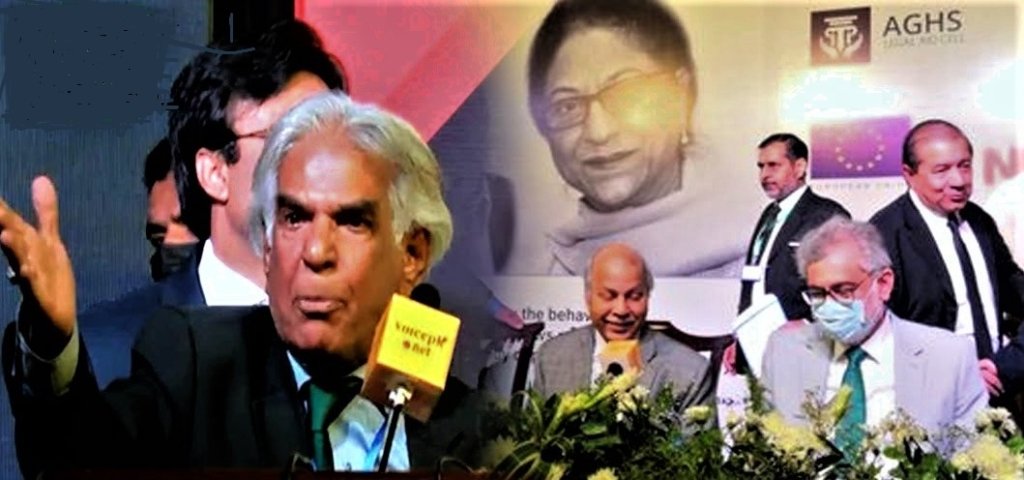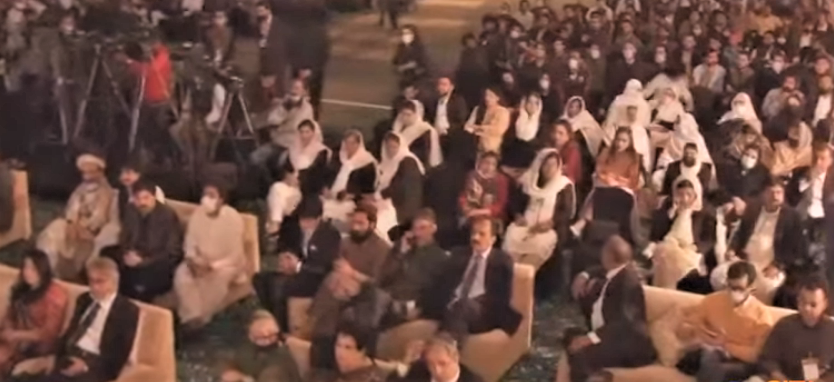Herald Report
Islamabad: The Asma Jahangir conference organisers have rejected claims that the event furthered any partisan agenda or violated the media-related laws by inviting a former prime minister to speak at the conference.

“The AJ Foundation vehemently rejects claims that the conference furthered any partisan agenda,” read a statement issued by the organisers on Sunday (Nov 28), a week after the conclusion of the two-day moot.
The AJF and its partners, the Supreme Court Bar Association (SCBA), and the Pakistan Bar Council (PBC), believe that leaders of opposition parties, big and small, should be invited to speak, and freedom of expression, even where it involves true but uncomfortable conversations, is the cornerstone of democracy, it stated.
“The AJ Foundation also wishes to bring on record that several prominent members of the ruling PTI party were invited to all three conferences, many of whom spoke at all three conferences, and others who declined the invitation.”
The third Asma Jahangir Conference last weekend generated a lot of debate and pointing fingers from the ruling PTI government.
The conference was put together set out a wide range of agenda on critical areas of human rights currently under challenge in Pakistan, the statement read.

There were 21 sessions on the right to dissent, Afghan crisis conflict in Kashmir, violence against women, rights of the child, freedom of religion and belief, state of the economy, and challenges to restoring democracy in Pakistan.
Holding great attraction apparently were guests from some remote parts of the country. Baba Jan from Gilgit-Baltistan and Manzoor Pashteen and Mohsin Dawar from the tribal districts of KP were star attractions on the first day of the conference that returns the calendar after a two-year suspension because of Covid-19.

PML-N leader Nawaz Sharif addressed the closing session keeping in tradition with events organized by bar councils where leaders of opposition parties are invited to speak.
The Pakistan People’s Party chairperson Bilawal Bhutto and Human rights minister Shirin Mazari had delivered the closing speeches of the first Asma Jahangir Conference in 2018, and former Prime Minister Yousaf Raza Gillani had delivered the closing speech of the second conference in 2019.
All three conferences provided a platform for politicians from all major and regional parties, to speak openly about issues impacting the rule of law and fundamental freedoms.
The AJF reiterates that no one was invited to speak at the conference in violation of any law. Pakistan Electronic Media Authority (PEMRA) has banned certain categories of individuals from being broadcasted on television, no such prohibition is placed on these individuals addressing public gatherings in general.
The statement recalled that former Prime Minister Nawaz Sharif had addressed gatherings previously and it is entirely regrettable not to say embarrassing that internet cables were disabled to blackout his speech.

“This act in itself is an indication of the state of freedom of expression in the current regime where Pakistan is ranked as 145 out of 180 countries.”
The statement mentioned that the current regime had allowed the airing of interviews of Ishaq Dar and former military chief General Pervez Musharraf even though both have been declared absconders by courts in Pakistan.
In contrast, it is the view of a large segment of the legal community that Mr Sharif’s conviction was politically-motivated; he was not provided due process and more recent events have sadly caused a further shakeup in the institutions of Pakistan.
By picking on conferences and personalities, the ruling regime is diverting attention from the real threat to institutions, the state of the economy and freedom of expression in the country, the statement read.

The hundreds of hours of voluntary work to put together this event is a testament to the commitment of the AJ Foundation, AGHS Legal Aid Cell, and other members of civil society who formed part of the conference committee, to the rule of law and democracy.
“AJ Foundation stands firmly with civil society in Pakistan which remains steadfast in its commitment to universal principles of human rights without fear or favour.”
Our position remains that we will not follow vendettas of political parties when inviting speakers, and the AJ Conference will remain an open and uncensored platform for diverse voices across the political spectrum, the organisers stated.
“It is the unanimous position of almost all bar councils that every person, including an absconder, has the right to freedom of expression, and this right is enshrined in our constitution. To brand the event as engaging in party politics is disappointing given no such claims were made at previous conferences where leaders of the opposition party were delivering the closing address.
It is also naïve and misleading to term the event as “political” given any discussion on human rights, democratic freedoms, and the rule of law is meaningless without the engagement of political personalities. Equally, it is impossible to engage in a debate on the rule of law and judicial accountability without the presence of the judiciary.

The format of the conference this year has remained the same as every other year where the chief guest for the opening ceremony is the Chief Justice of Pakistan along with other judges. The closing ceremony of the second day is presided over by policymakers and leaders of the main opposition parties which are befitting given the purpose of the conference is to find solutions to real challenges rather than simply echo the sentiments of whichever party is in power at the time.
Indeed, the reception of an event that is uncensored and is widely attended by opinion-makers from across the spectrum, confirms the state of our democratic freedoms.
The organisers reiterated to keep this format alive for all stakeholders and leaders of opposition parties in the future, regardless of partisan politics. The sign of a true democracy is where the ruling party provides space to opposition parties to share their narrative, and people are not only able to exercise their right to freely express themselves but also have the choice to hear differing narratives.
They thanked CJP Gulzar Ahmad, other judges, and the over 160 speakers as well as the over 3000 participants of the conference.
The impressive turnout was a result of the inclusive and uncensored agenda, the observers including 600 lawyers, incumbent and former office-bearers of the PBC, SCBA, and HCBAs, members of civil society organisations, students, and women lawyers who had travelled from Quetta, Sindh to attend the event.
The Conference has maintained itself as the largest human rights and legal moot in Pakistan and this year was no different. For this reason, it is often referred to as the People’s Assembly.
